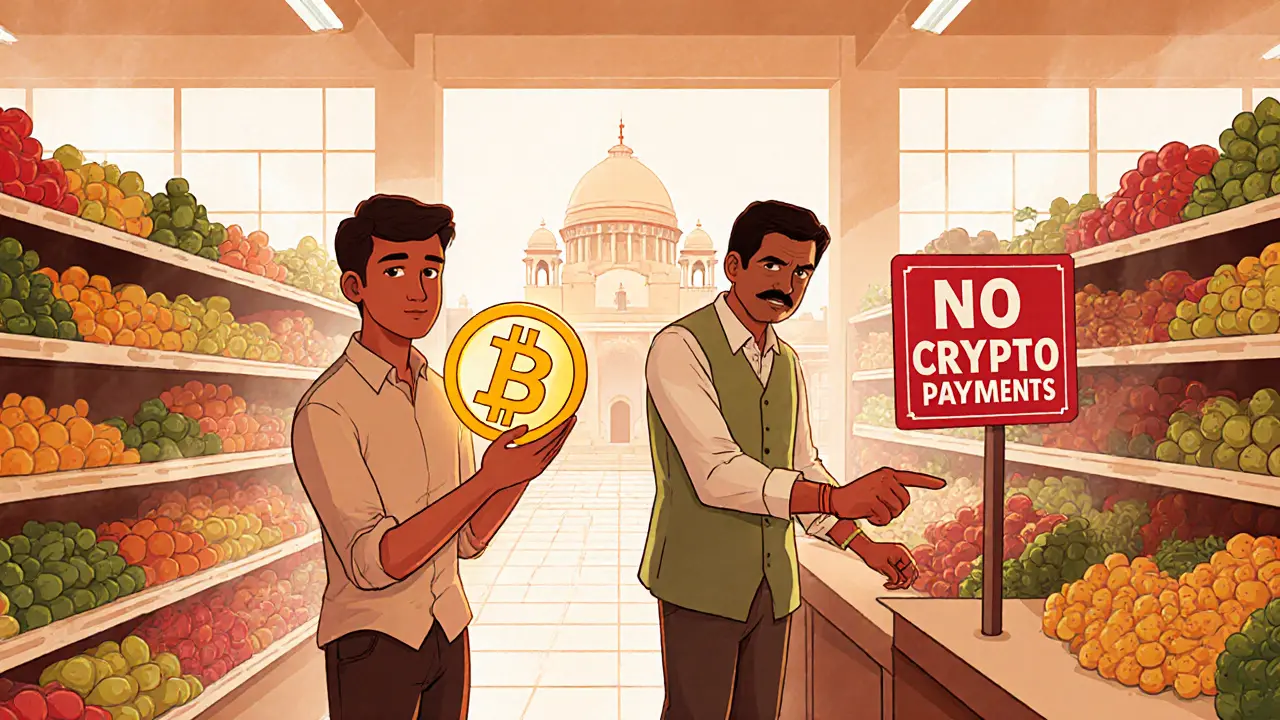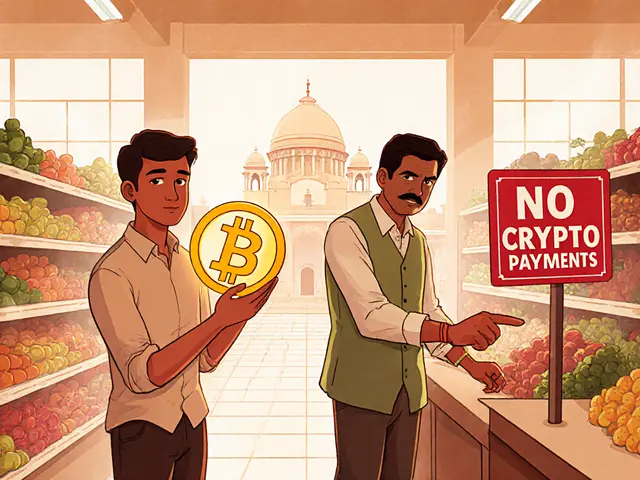Are Crypto Payments Allowed in India? Legal Facts & Tax Implications

Crypto Tax Calculator for India
Calculate your tax liability when trading crypto in India based on the current 30% flat tax and 1% TDS rules.
India’s crypto scene feels like a roller‑coaster: you can buy, sell and hold digital coins, but you can’t use them at the grocery store. If you’re wondering whether you can actually pay for goods or services with Bitcoin, Ether or any other token, the short answer is no - the law is crystal clear about that. Below we break down what’s allowed, what’s banned, how the tax man looks at crypto, and what the upcoming digital rupee means for everyday payments.
Quick Takeaways
- Cryptocurrencypayments for goods or services are prohibited under Indian law as of 2025.
- Trading, holding and investing in crypto are legal, but they must comply with a 30% flat tax and 1% TDS on transactions above ₹50,000.
- The Reserve Bank of India (RBI) drives the policy narrative and is rolling out a Central Bank Digital Currency (CBDC) called the digital rupee.
- All crypto exchanges must be registered with the Financial Intelligence Unit‑IND (FIU‑IND) and follow strict KYC/AML rules.
- Violating payment prohibitions can attract penalties, and using crypto anonymously beyond reporting thresholds is a punishable offense.
What the Law Says About Crypto Payments
In 2025 the Indian government classifies all digital tokens as Virtual Digital Assets (VDAs) (a category under the Income Tax Act, 1961, covering Bitcoin, Ether, stablecoins and similar tokens). While VDAs can be bought, sold, and held, the statutes explicitly forbid using them as a medium of exchange for everyday purchases.
The prohibition is codified in the Finance Act 2022 and reinforced by Finance Ministry guidelines released in early 2023, which state: “No person shall accept or make payment of any consideration for goods or services in any VDA.” Breaking this rule can lead to fines, tax notices, or even criminal proceedings under the Prevention of Money Laundering Act (PMLA).
Why Payments Are Banned but Trading Is Allowed
The policy split stems from two core concerns:
- Monetary stability: The Reserve Bank of India (RBIIndia’s central bank, which has consistently warned about the macro‑economic risks of private crypto) fears that widespread crypto payments could undermine the Indian rupee’s role as legal tender.
- Consumer protection: Private tokens lack a regulatory safety net, making users vulnerable to fraud, market volatility, and loss of funds.
By allowing trading under a regulated framework, the government can tax the activity, track money flows through FIU‑IND, and still keep a firm grip on the country’s payment system.
Tax Landscape for Crypto Traders
Taxation in India is straightforward but unforgiving:
- A flat 30% tax on any income derived from VDAs, plus a 4% cess - no deductions for expenses other than the cost of acquisition.
- Tax Deducted at Source (TDSa 1% withholding tax on crypto transactions exceeding ₹50,000)
- Platform fees are subject to an 18% GST, which exchanges must reflect on invoices.
- All crypto activity must be disclosed in Schedule VDA of the ITR‑2 or ITR‑3 filing.
Failure to comply can trigger penalties ranging from ₹10,000 to ₹1lakh per non‑disclosed transaction, and the tax authorities may reject your return altogether.
Regulatory Bodies Involved
Multiple agencies keep an eye on the crypto market, each with a distinct role:
| Authority | Mandate | Recent Action (2024‑25) |
|---|---|---|
| RBIIndia’s central bank | Monetary policy, payment system stability | Launched digital rupee pilot in 4 states |
| FIU‑INDFinancial Intelligence Unit‑India, enforcement arm for AML compliance | Register exchanges, enforce AML/KYC, levy fines | Fined Binance ₹18.82cr, Bybit ₹9.27cr for non‑registration |
| SEBISecurities and Exchange Board of India, regulator for securities markets | Oversight of crypto assets that qualify as securities | Proposed a multi‑regulator framework for tokenised assets |
| Ministry of FinanceCabinet ministry responsible for fiscal policy and tax law | Drafting tax rules, preparing potential crypto ban bill | Implemented 30% flat tax, overseeing GST on platform fees |
Allowed vs. Prohibited Crypto Activities
| Activity | Status | Key Requirement |
|---|---|---|
| Buying VDAs on a registered exchange | Allowed | KYC/AML compliance, FIU‑IND registration |
| Selling VDAs on a registered exchange | Allowed | Same as buying, pay 30% tax on gains |
| Holding VDAs in a personal wallet | Allowed | Report holdings in Schedule VDA |
| Using VDAs to pay for groceries | Prohibited | Violates Finance Act 2022 |
| Accepting crypto as salary | Prohibited | Considered payment for services |
| Operating an unregistered crypto exchange | Prohibited | Subject to FIU‑IND penalties |
| Anonymous transactions above ₹50,000 | Prohibited | TDS and reporting required |
Digital Rupee: The RBI’s Answer to Crypto Payments
The central bank’s big project, the digital rupeeIndia’s Central Bank Digital Currency (CBDC) that is legal tender and fully regulated, aims to give users the speed and convenience of crypto without the regulatory headaches.
Key differences between the digital rupee and private crypto:
- Backed by the RBI, so it’s legal tender.
- Transactions are recorded on a permissioned ledger, allowing real‑time oversight.
- No tax on the currency itself - it’s treated like cash.
For now, the digital rupee is limited to pilot programs in select cities, but the RBI plans a nationwide rollout by 2026. Once live, merchants will be able to accept it just like any other electronic payment, effectively providing a “crypto‑like” experience that the government can monitor.

Practical Steps If You Want to Trade Crypto in India
- Choose a FIU‑IND‑registered exchange. Popular options include WazirX, CoinDCX, and the Indian arm of Binance.
- Complete KYC using PAN, Aadhaar, and a verified bank account.
- Keep detailed transaction logs - date, amount, price, and counter‑party - for tax reporting.
- Calculate gains and apply the 30% flat tax; pay the 1% TDS when you sell above ₹50,000.
- File Schedule VDA with your annual ITR, attaching supporting documents.
- Avoid using your crypto wallet to pay anyone directly; instead, convert to INR on the exchange before making purchases.
Following these steps keeps you on the right side of the law while still letting you benefit from crypto’s price movements.
Potential Future Changes
While the current framework is strict, the Indian government is still debating a comprehensive crypto bill. Some analysts say a future law could introduce a licensing regime for crypto businesses, possibly relaxing the payment ban if robust consumer‑protection measures are added. Others argue the RBI will double down on the digital rupee and push an outright ban on private tokens.
What matters now is staying compliant: monitor RBI announcements, watch for updates from the Ministry of Finance, and keep an eye on any new FIU‑IND circulars that tweak AML thresholds.
Bottom Line for Consumers and Merchants
If you’re a consumer, you can safely buy and sell crypto on approved platforms, but you must convert to INR before paying for anything. Merchants should not accept crypto directly - doing so risks heavy penalties. Instead, consider integrating the digital rupee once it’s widely available; it offers the speed of crypto with full legal backing.
Frequently Asked Questions
Can I pay my electricity bill with Bitcoin in India?
No. The Finance Act 2022 explicitly bars any use of Virtual Digital Assets as payment for goods or services, including utility bills.
Do I need to pay GST on crypto trades?
GST is applied only to platform fees charged by exchanges, not to the actual trade profit. Exchanges must charge 18% GST on the fee they collect.
What happens if I receive crypto as salary?
Receiving crypto as salary counts as payment for services, which is prohibited. The employer and employee could face penalties; the amount must be converted to INR and taxed as salary income.
Is the 30% tax on crypto a capital gains tax?
It functions like a capital gains tax but is a flat rate applied to any profit from VDAs, irrespective of holding period. No offset for losses is allowed.
Will the digital rupee replace private cryptocurrencies?
Not likely in the near term. The digital rupee targets everyday payments, while private crypto will remain an investment class unless the regulatory bill changes that stance.


Anjali Govind
I’ve been tracking the tax filings since the Finance Act came out, and the 30 % flat rate really bites when you have big gains. Make sure you keep a detailed ledger of every buy‑sell pair, because the FIU‑IND will cross‑check your TDS entries. If you cross the ₹50,000 threshold, the 1 % TDS is automatically deducted at source, so you don’t have to remember it later. Also, the digital rupee pilot is already live in a few states, meaning you can get crypto‑like speed without the legal headaches. For now, converting to INR before any purchase is the safest route, otherwise you risk hefty penalties. And don’t forget to attach the GST‑inclusive exchange fee receipts when filing your ITR.
Sanjay Lago
Yo, just stick to a registered exchange and you’ll be golden!
Annie McCullough
Crypto payments are a no‑go in India per the 2022 Finance Act, so any attempt to circumvent that is basically a red‑flag on AML compliance 🤖
Carol Fisher
India will never let foreign crypto dominate our markets – keep it local, keep it legal! 🇮🇳💪
Melanie Birt
Here’s the quick cheat‑sheet: 30 % tax on any VDA profit, 1 % TDS if the transaction tops ₹50k, and mandatory reporting on Schedule VDA.
Don’t forget the 18 % GST on exchange fees – it’s a simple addition to the fee you already pay.
And always keep your PAN and Aadhaar linked to the exchange; the FIU‑IND checks those details constantly.
Stay compliant and you’ll avoid the heavy fines that have hit big players lately. 😊
Lady Celeste
Too many people think crypto is free money; it isn’t.
Scott Hall
If you’re feeling unsure, just start small, log every trade, and use the calculator they provided. It’ll give you confidence and keep the tax man happy.
Jade Hibbert
Sure, “golden” until you get slapped with a ₹10k penalty for a slip‑up. Nice optimism, though.
Hanna Regehr
Let’s keep the momentum – set up your KYC, use the calculator, and remember the digital rupee will soon make payments painless.
hrishchika Kumar
Picture this: you’re buying a chai with crypto, the cashier says ‘nah’, you smile, pull out a QR for digital rupee and everyone’s happy. That’s the future we’re building, colorful and compliant.
Lena Vega
Remember: reporting is mandatory, no exceptions.
Laura Myers
Honestly, the drama around crypto bans is overblown; the law is clear and the penalties are real, so act accordingly.
Manas Patil
From a compliance standpoint, the VDA classification means every token transaction is a taxable event – think of it as the same as trading derivatives on an exchange.
Ethan Chambers
One might argue that the prohibition is a mere bureaucratic whim, but the macro‑stability arguments hold substantial weight in monetary theory.
gayle Smith
Everyone’s yelling about decentralisation, yet they ignore that the Indian government is actually paving the way for a regulated digital currency ecosystem.
mark noopa
When we look at the broader philosophical implications of a nation-state dictating the permissible mediums of exchange, we are essentially confronting the age‑old tension between sovereign authority and individual autonomy. The Finance Act of 2022 codifies a clear prohibition on using Virtual Digital Assets as a direct means of payment, which on the surface appears to be a straightforward regulatory measure. However, beneath this legal veneer lies a complex matrix of economic, social, and ethical considerations that merit deeper scrutiny. Economically, the central bank's fear of monetary instability is not unfounded; an unchecked proliferation of privately issued tokens could erode the seigniorage benefits that accrue to the government. Socially, the prohibition aims to safeguard consumers from the volatility and potential fraud endemic to the crypto market, yet it simultaneously curtails the innovative spirit that could empower financially underserved populations. Ethically, the tension between protecting citizens and restricting freedom of financial expression raises questions about paternalism versus liberty. Moreover, the 30 % flat tax regime imposed on gains from VDAs, coupled with the 1 % TDS on transactions exceeding ₹50 000, reflects a fiscal strategy aimed at revenue extraction while attempting to dissuade large‑scale informal trading. The act of mandating schedule VDA disclosures in tax returns further embeds the state’s oversight capacity, ensuring traceability. In juxtaposition, the Reserve Bank’s development of the digital rupee offers a state‑backed alternative that mirrors many of the advantages touted by private cryptocurrencies-speed, low friction, and digital accessibility-yet retains full regulatory oversight. This dual approach suggests a nuanced policy direction: embracing technological advancement while preserving monetary sovereignty. As we anticipate future legislative debates, it is plausible that a licensing framework for private crypto enterprises could emerge, potentially relaxing the current payment ban under stringent consumer‑protection safeguards. Until such reforms materialize, the pragmatic path for Indian users is to engage with registered exchanges, diligently compute tax liabilities using the provided calculators, and convert any VDA holdings to INR before attempting any real‑world purchase. In summary, compliance with the current statutory framework not only averts punitive measures but also positions stakeholders advantageously for the eventual integration of regulated digital assets into everyday commerce. 😊
Rama Julianto
Your cheat‑sheet is useful, but let’s be real – the 30 % tax is a killer and the FIU‑IND audits are relentless. Stop sugar‑coating it!
Helen Fitzgerald
Remember, we’re all navigating this together – ask questions, share resources, and keep the community informed.
Ben Parker
Wow, drama queen alert 🚨 but yes, the government’s roadmap actually includes a CBDC, so there’s some sense in that.